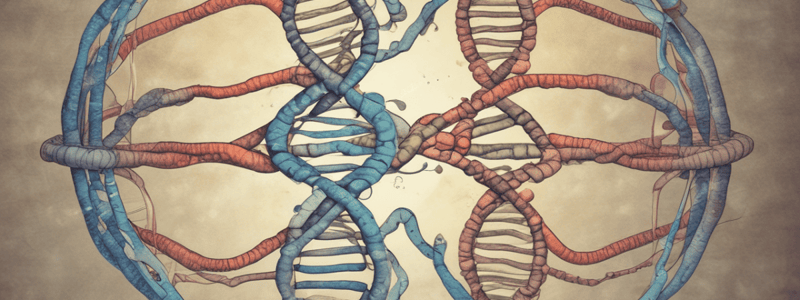Podcast
Questions and Answers
What is the main mechanism that leads to structural chromosomal abnormalities?
What is the main mechanism that leads to structural chromosomal abnormalities?
- Epigenetic changes in gene expression
- Mutations in specific genes
- Imbalanced gene expression
- Breakage and incorrect rejoining of chromosomal segments (correct)
Which of the following environmental factors is NOT responsible for structural chromosomal abnormalities?
Which of the following environmental factors is NOT responsible for structural chromosomal abnormalities?
- Viral infections
- Ultraviolet light
- Ionizing radiation
- Hormonal imbalance (correct)
What is the primary indication for routine chromosome investigation in a patient with a family history of chromosome abnormality?
What is the primary indication for routine chromosome investigation in a patient with a family history of chromosome abnormality?
- Recurrent fetal loss
- Abnormal ultrasound scan of the fetus
- Prenatal screening for Down's syndrome
- Constitutional abnormalities (correct)
What is the consequence of a balanced rearrangement in some cases?
What is the consequence of a balanced rearrangement in some cases?
Which type of structural abnormality involves the exchange or rearrangement of genetic material without causing any missing or extra genetic material?
Which type of structural abnormality involves the exchange or rearrangement of genetic material without causing any missing or extra genetic material?
What is the result of incorrect rejoining of chromosomal segments in a structural abnormality?
What is the result of incorrect rejoining of chromosomal segments in a structural abnormality?
Which of the following is NOT a main indication for routine chromosome investigation?
Which of the following is NOT a main indication for routine chromosome investigation?
What is the consequence of an unbalanced chromosomal complement?
What is the consequence of an unbalanced chromosomal complement?
Which type of structural abnormality involves the breakage of a chromosome and the reunion of the broken ends to form a circle?
Which type of structural abnormality involves the breakage of a chromosome and the reunion of the broken ends to form a circle?
What is the term for the exchange of genetic material between two non-homologous chromosomes?
What is the term for the exchange of genetic material between two non-homologous chromosomes?
Flashcards are hidden until you start studying
Study Notes
Structural Abnormalities
- Unbalanced rearrangement: results in incorrect amount of chromosomal material, associated with severe clinical effects
Types of Structural Abnormalities
- Deletion: loss of genetic material, resulting in monosomy for the segment
- Terminal deletion: involves a single break of the terminal part of the chromosome, broken part is lost
- Interstitial deletion: involves two breaks, intervening portion of the chromosome is lost
- Cri-du Chat syndrome: deletion of short arm of chromosome 5, incidence 1:20,000 to 1:50,000 births, characterized by underdevelopment of larynx, mental retardation, microcephaly, and facial anomalies
Duplication
- Extra copies of a chromosome part
Inversion
- Involves two breaks along the chromosome, resulting in a reversed segment
- Pericentric inversion: inverted segment involved both p and q arms with centromere
- Paracentric inversion: inverted segment involved only one arm
Ring Chromosome
- Loss of telomeres or ends of both arms of the chromosome, forming a ring structure
Isochromosome
- Creation of two non-identical chromosomes, one a combination of two short arms, the other a combination of two long arms
- Turner syndrome: example of an isochromosome
Insertion
- Rearrangement of genetic material to a non-homologous chromosome, no loss of genetic material
Translocation
- Exchange of genetic material between two chromosomes
- Reciprocal translocation: exchange of genetic material between two non-homologous chromosomes, no loss of genetic material
- Robertsonian translocation (centric fusion): break at or near the centromere in two acrocentric chromosomes, subsequent fusion of long arms, and loss of fragment formed by fusion of short arms
Causes of Structural Abnormalities
- Environmental factors: ionizing radiation, ultraviolet light, chemical agents, viral infections
Patient Ascertainment
- Indications for routine chromosome investigation:
- Constitutional (congenital) abnormalities
- Prenatal screening (Down's syndrome, especially raised maternal age, family history of chromosome abnormality, abnormal ultrasound scan of fetus)
- Birth defects (malformations, mental retardation)
- Abnormal sexual development (e.g., Klinefelter's syndrome)
- Infertility
- Recurrent fetal loss
- Acquired abnormalities (leukemia and related disorders)
Studying That Suits You
Use AI to generate personalized quizzes and flashcards to suit your learning preferences.


